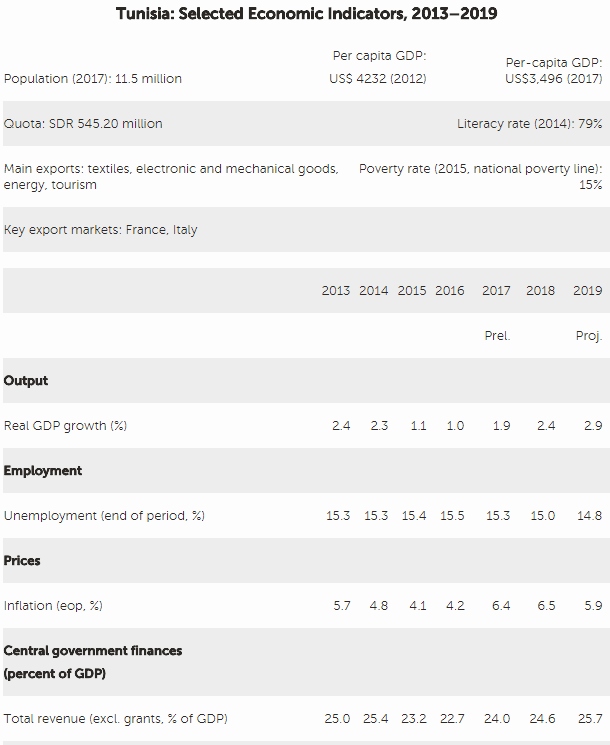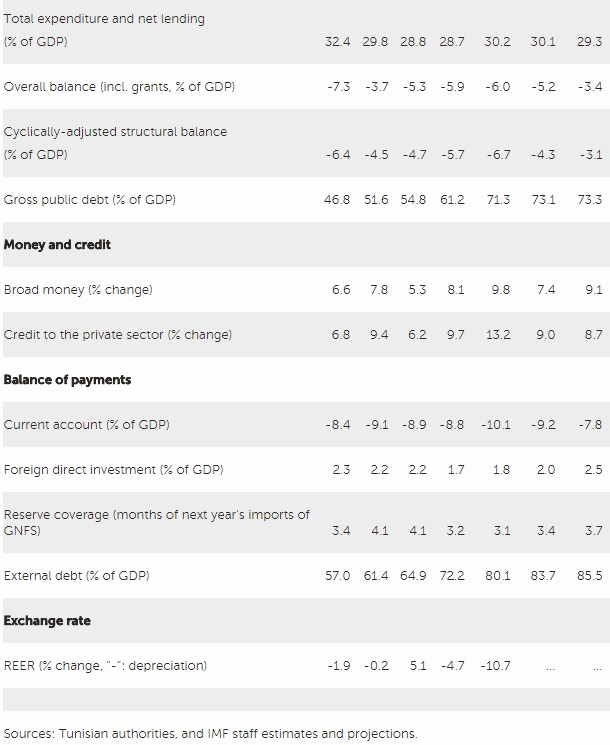IMF Executive Board Concludes 2017 Article IV Consultation with Tunisia
On March 23, 2018, the Executive Board of the International Monetary Fund (IMF) concluded the Article IV Consultation with Tunisia.
Economic growth almost doubled to 1.9 percent in 2017, as confidence strengthened on the back of improved security and the unity government’s early progress with policy and reform implementation. Investment and exports remained sluggish, however. Growth is expected to reach 2.4 percent in 2018, helped by a good agricultural season and a pickup in manufacturing and tourism. The unemployment rate remains high at 15 percent, especially affecting the youth, women, and the population of the interior regions.
Inflation accelerated to an annualized 7.1 percent in February 2018, driven by dinar depreciation (10 percent real depreciation in 2017), wage hikes in the public and the private sector, and increases in administrative prices. In response, the authorities widened the interest rate corridor to 200 basis points in January and increased the policy interest rate by 75 basis points to 5.75 percent in March.
The current account deficit deteriorated to a record 10.1 percent of GDP at the end of 2017. Exports remained sluggish, while imports increased due to high domestic energy needs, strong consumption demand underpinned by rapid credit growth, and the impact of the dinar depreciation on import prices. Trade data for early 2018 show an improvement in export performance, while import growth is slowing. This favorable trend is expected to continue throughout the remainder of the year, supported by a more favorable real exchange rate. International reserves declined to 2.5 months of imports in March 2018, including due to higher-than-programmed central bank foreign exchange sales and delayed external financing.
Public and external debt further increased, reaching 71 percent of GDP and 80 percent of GDP at the end of 2017, respectively. These trends reflect the combined impact of high fiscal and current account deficits, the dinar depreciation, and lower-than-envisaged growth. Public and external debt are projected to reverse their upward trend starting in 2020, helped by a three-percent-of-GDP reduction in the fiscal deficit over 2018-20 and a sustained recovery of growth. This outlook relies on strong implementation of the authorities’ fiscal plans that seek to spread the adjustment burden equitably across society. Their plans include new tax measures worth 2.2 percent of GDP in 2018, quarterly adjustments of fuel prices to contain the growth of energy subsidies, civil service reform based on voluntary separations and strict hiring limits, and pension reform. In parallel, the authorities are developing a better targeted social safety net to protect the most vulnerable from the impact of fiscal adjustment.
The banking sector remains stable but suffers from structurally low liquidity as savings remain weak. The recent inspections of the seven largest private banks showed no major vulnerabilities. The banking sector’s foreign currency exposure remains low, credit risk is mitigated by the recovery in growth, and interest margins remain comfortable.
Medium-term prospects for Tunisia’s economy remain favorable, with growth projected to reach 4 percent by 2022. This outlook hinges on sustained reforms aimed at improving governance and the business climate, broadening access to finance, and modernizing fiscal institutions to improve service delivery while making them more efficient. Recent progress with the establishment of the High Anti-Corruption Authority, the creation of the one-stop shop for investors, the performance contracts for public banks and state-owned enterprises, and the laws to facilitate banks’ NPL reduction is supporting this agenda.
Executive Board Assessment
They noted that Tunisia faces economic and socio-political challenges. Adverse shocks combined with policy slippages and delays in structural reforms have hindered economic recovery and increased macroeconomic vulnerabilities. Noting weak program implementation and high risks to the program, Directors urged the authorities to strengthen their commitment to the program and take urgent and decisive action to put public finances on a more sustainable path, address rising inflation and falling reserves, and ensure macroeconomic stability. Directors generally agreed that moving to quarterly reviews would facilitate implementation of the Fund-supported program.
Directors advised the authorities to press ahead with fiscal consolidation. To increase investment and social expenditure, they underscored that adjustment efforts should focus on increasing tax revenue and reigning in current spending. Directors called for continued emphasis on strengthening tax collection, implementing the voluntary separations for civil servants, curtailing new wage increases unless growth surprises significantly, and enacting quarterly fuel price increases. They supported the authorities’ efforts to maintain adequate social protection, including through equitable and sustainable pension reforms. Directors also highlighted the importance of targeted programs for the most vulnerable.
Directors welcomed the recent increase in the policy interest rate. They underscored that further tightening of monetary policy will be necessary to reduce inflation. Directors stressed that reducing foreign exchange interventions and increasing exchange rate flexibility would help improve the current account and rebuild international reserves.
Directors saw need for further financial sector reforms. They encouraged the authorities to build on recent achievements, including the establishment of the High Anti-Corruption Authority, and accelerate steps such as the one-stop shop for investors and the legislation to facilitate the reduction of banks’ NPL portfolios. Directors noted that enhancements to the AML/CFT regime will help address Tunisia’s deficiencies in this area.
Directors noted the advancements made in implementing structural reforms. They encouraged the authorities to accelerate efforts to complete the civil service reform, strengthen the selection and efficiency of public investment projects, and improve the management of SOEs. Directors also emphasized that priority needs to be given to reforming the energy sector, including addressing subsidies. They encouraged the authorities to build on the progress made in improving the business environment, especially streamlining the regulatory environment, and promoting good governance and transparency.


Source: International Monetary Fund
- 330 reads
Human Rights
Fostering a More Humane World: The 28th Eurasian Economic Summi

Conscience, Hope, and Action: Keys to Global Peace and Sustainability

Ringing FOWPAL’s Peace Bell for the World:Nobel Peace Prize Laureates’ Visions and Actions

Protecting the World’s Cultural Diversity for a Sustainable Future

Puppet Show I International Friendship Day 2020

